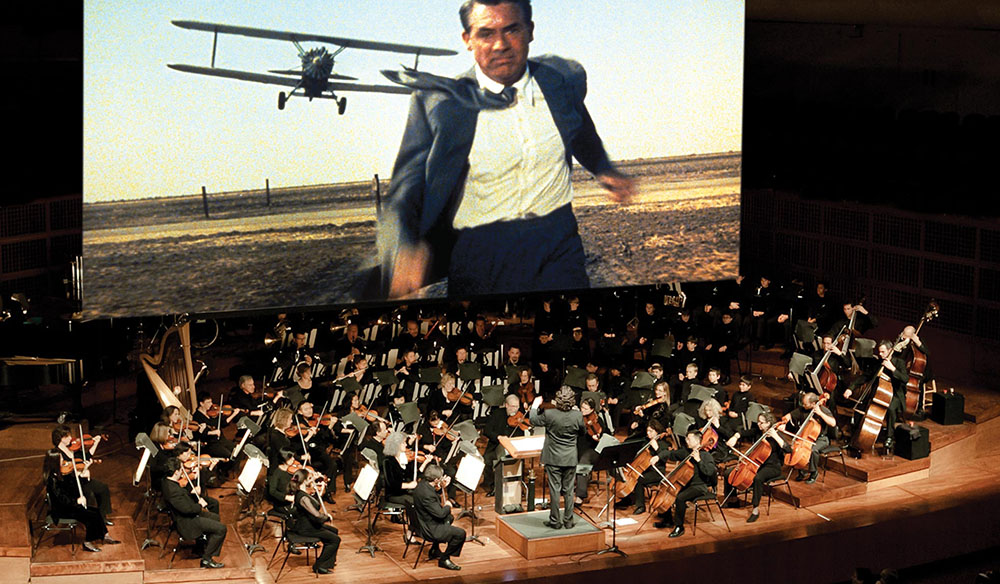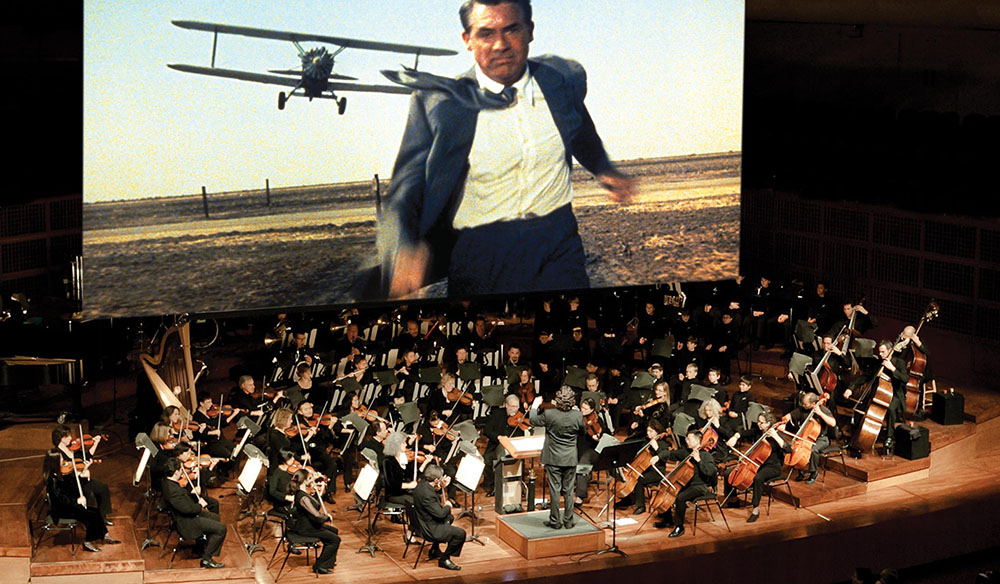Over the last five years, we have entered into a new generation of film music composers. Though the likes of Hans Zimmer and Alan Silvestri are still regularly producing great scores, a new class has joined the scene. In this post, I will be leading you through some of the most notable names in film scoring and explaining a bit about their discographies, styles, and impacts on the industry.

Ennio Morricone and Bernard Hermann
Ennio Morricone (left) and Bernard Hermann (right) were practically the first great composers for film. Simply put, they were the pioneers of making film scores a piece of art in their own as opposed to an afterthought of a director. Bernard Hermann’s most notable works include Taxi Driver, Citizen Kane, and Psycho and Ennio Morricone composed the unmistakable theme for The Good, the Bad, and the Ugly (along with practically every successful western film at the time) and the scores for Cinema Paradiso, The Thing, and Roland Joffé’s The Mission.

Though Bernard Hermann definitely leaned more into his string sections whereas Ennio Morricone generally leaned more into horns and woodwinds with strong piano leads, they both worked with full orchestras and were the first to interact with them (in relation to film) in such a way that the connection between a film and its score felt truly natural and intentional.
Danny Elfman and Howard Shore
Danny Elfman and Howard Shore are names that, as far as film scoring goes, are relatively well known. The reason I grouped them together here, however, is that (at risk of sounding dismissive) they are known for a specific series of work but the majority of their discographies are not particularly significant.
For Danny Elfman this is practically Tim Burton’s entire filmography – he scored Burton’s Batman films, Edward Scissorhands, Beetlejuice, Mars Attacks, etc. Also notably, he scored the Tobey Maguire Spider-man trilogy, Goodwill Hunting, and Men in Black though generally these aren’t films people think of in relation to amazing scores. For Howard Shore this is the Lord of the Rings films and, secondarily, Scanners, The Fly, and SIlence of the Lambs. All great soundtracks but without Lord of the Rings, it would surprise me if he were anywhere near his current level of success.
In terms of particularly interesting staples of their work, there isn’t really that much to say about Howard Shore in my opinion. For Danny Elfman, his creepy high-pitched melodies and fast paced horn parts are unmistakable and his mesh of purely orchestral and occasional inclusion of synthesizer sounds and electronically produced elements is genius.
John Williams

For me, John Williams is an unmistakable icon of late 20th century film. Schindler’s List, Jaws, Indiana Jones, Star Wars, Jurassic Park, Harry Potter – if you ask someone to sing a tune from a film, it was probably written by John Williams. Still remaining in the almost purely orchestral lane, I wouldn’t say anything specific he did was unbelievably ground-breaking but its impossible to talk about film music without at least nodding your head to the composer of probably the best themes of modern cinema. Another thing that John WIlliams did incredibly well is the leitmotif (a piece of music that plays in reference to the presence of a character on screen). This is in no way a new concept at all – Roman and Greek plays and classical operas used them, Bernard Hermann used them even for concepts and objects in Citizen Kane – but the Imperial March, the Jaws theme, and the leitmotif of the aliens in Close Encounters of the Third Kind have gone beyond their context to represent the ideas of evil, sharks, or aliens in casual social situations.
Someone who I feel has always just been one step behind John Williams and therefore has not gotten the credit he deserves (not to mention that he is, in my opinion, currently making the best scores of his career) is Alan Silvestri. It’s an unlikely name to come up in a regular discussion of the greats but likely one you might recognise nonetheless. Forrest Gump, the Polar Express, and Back to the Future are great soundtracks but nothing extraordinary considering the time. Much more of note is his work on the majority of the MCU films. Though I would say they started off with fairly disappointing scores, Silvestri’s work in that universe has gradually grown and built up to be something that, especially for the last two Avengers films has become an iconic pillar of the MCU.
Hans Zimmer
Generally when younger people think of film music, Hans Zimmer is the first name on everyone’s list and there is a reason for that. On the surface level, the scores are great – The Lion King and Pirates of the Caribbean are icons of their generation and the music is a large part of the reason for that. It’s also hard to sit through a Christopher Nolan movie without noticing the excellent music. The reason that I think Zimmer is so admired, however, is the genuine creativity to every project he does. There is always something for each film that is not only new to him, but usually new to the industry.
His incredible mesh of perfectly modelled synthesizers and orchestral sounds is unrivalled and each project relates to its music in so much more of a personal way than the music of, for example, John Williams or Howard Shore. For The Lion King, African vocals and drum patterns were melded with the familiar western orchestral sounds you expect from a Disney movie, for Dunkirk, Zimmer incorporated ticking clocks into almost every track of the score, for Inception, the sounds of regular instruments were stretched to a point where they are practically unrecognisable, for The Dark Knight, Zimmer famously used razor blades on violin strings to create the edgy sounds of Heath Ledger’s Joker, and for Interstellar, he replaced a lot of his regular sound choices with organs to emulate the vastness of space. The list goes on and there are absolutely no misses.
Someone to note in reference to Hans Zimmer is Tom Holkenberg (a.k.a. Junkie XL). He was somewhat of a protégé to Zimmer for a long time. On the Inception score album, there are Junkie XL remix tracks and they worked together on some of the scoring for DCEU films like Batman v Superman and Wonder Woman with Zimmer actually writing the famous Wonder Woman theme. Junkie XL also scored Mad Max: Fury Road and Justice League and, though I wouldn’t necessarily label him as the new generation, his sounds are definitely modern and I hope he continues to get opportunities for great films because his current discography unfortunately looks like a list of flops with great soundtracks with the ocassional Deadpool and Mad Max poking through.
Ramin Djawadi and Ludwig Göransson
As you can tell from the above rambling on Hans Zimmer, I’m a big fan of his work but honestly that’s almost nothing compared to my admiration for Ludwig Göransson and, less so but in no real negative way, Ramin Djawadi. Both of them have definitely chosen bad projects (Göransson’s most recent release is Bad Trip and say what you will about The Queen’s Corgi but Ramin Djawadi’s score was not a downside of that film). That being said, Westworld and Game of Thrones have, in my opinion, the best TV soundtracks of all time and it’s not even close. Light of the Seven is arguably the best track of any TV soundtrack and Djawadi’s orchestral covers of Runaway, Sweet Child O’ Mine, Space Oddity, and Paint It Black (among others) are the perfect mixes of modernity and tradition to fit to Westworld‘s brilliant but unusual world building and overall energy.
Ludwig Göransson, at least in relation to those that I have seen, has executed perfect soundtracks to what are honestly pretty difficult worlds. In preparation for Black Panther, Göransson spent months in Africa with musicians to incorporate authentic sounds of the area, including talking drums that are communicating the names of the characters for which they act as leitmotifs. His mesh of Hip-Hop into his scores is perfect (probably largely thanks to his work producing albums like Because the Internet, Awaken! My Love and helping with anything in Childish Gambino’s discography all the way from Culdesac to the Summer Pack project that came out in summer of 2018) and can be seen most brilliantly in Black Panther, Creed II, and more subtly in Fruitville Station.
In a similar fashion to Hans Zimmer, his music creates a much deeper bond with the concept of a project than a lot of scores. For Tenet, for example, he composed pieces for orchestra that were entirely backwards and partially palindromic so that they could be reversed digitally and played around with from that jumping off point. His experience in Hip-Hop also helped create The Plan – the Travis Scott song that played at the end of Tenet – and, more interestingly, using Travis’s vocals throughout the soundtrack of the entire movie. For The Mandalorian Göransson uses a traditional recorder to create the sound of the Mandalorians and for Creed II, all of the percussion elements throughout the soundtrack (even including the original songs featuring vocals from Tessa Thompson) are recoded from elements of a boxing gym.
Thank you for reading and I hope you enjoyed this post. Be sure to check out more of our content at ScreenHub Entertainment such as my post of where Yasuke‘s soundtrack by Flying Lotus missed its mark or my recommendations for foreign language shows to watch on Netflix.

One thought on “A Brief Who’s Who of Film Music – ScreenHub Entertainment”